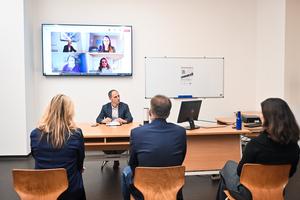The Ludovika University of Public Service (LUPS) and the Central European Service for Cross-Border Initiatives (CESCI) jointly established the Research Group on Cross-Border Cooperation, which, together with the Institute of Peace and Conflict Studies at the University of Granada (UGR IPAZ), organized an international hybrid conference titled “Cooperation and Conflicts in the Age of Uncertainty” on November 28, 2024, as part of the Hungarian Science Festival.
The hybrid nature of the all-day event stemmed from the fact that the presentations took place in two connected online lecture halls: one at LUPS’ Wing Building in Budapest, and the other at the University of Granada in Southern Andalusia. Additionally, some speakers joined the event online from other locations, including Chile and Transylvania.
The purpose of the conference was to strengthen cooperation between universities through the exchange of professional experiences. Its focus was on the issues of borders and cross-border cooperation. Recent events, such as the 2015 refugee crisis, the COVID-19 pandemic, the Russia–Ukraine war, and Middle Eastern conflicts, along with their socio-economic impacts, have led to a rethinking of borders. The European discourse changed fundamentally: instead of the elimination of borders and border obstacles, the issue of security has become the priority, resulting in the reclosure of borders, the construction of new ones, and the application of stricter border controls. Based on these experiences, the organizers announced the international event.
The conference was opened by Réka Varga, dean of the Faculty of Public Governance and International Studies at LUPS. In her speech, she welcomed the establishment of the collaboration between the two universities and emphasized the topicality of the conference’s theme and its importance to the faculty’s academic activities.
This was followed by José Ángel Ruiz Jiménez, director of the UGR IPAZ, who, in his welcome speech, highlighted that this was the first time the IPAZ, which has been operating within the University of Granada for decades, collaborated with an institution in Budapest.
Finally, Dániel Gazsó, the initiator and main organizer of the conference, a research fellow and lecturer at the Department of Governance and Public Policy of LUPS, and a member of the LUPS–CESCI joint research group, welcomed the speakers in English and Spanish. Then, in his speech, he also emphasized the multidisciplinary nature of the conference. The successive sessions connected three academic fields: Cross-Border Studies, which is the main area of the LUPS–CESCI joint research group; Peace Research, which is the focus of the University of Granada’s research institute; and Minority Studies, encompassing kin-state activism.
In the first panel of the conference, José Ángel Ruiz Jiménez presented on the impact of armed conflicts on world order from a historical perspective. Zsuzsanna Fejes, associate professor at the Department of Governance and Public Policy of LUPS and leader of the LUPS–CESCI joint research group, discussed the evolution and future challenges of territorial cross-border cooperation. Melinda Istenes-Benczi, also a member of the research group, provided various methodological approaches to the comparative analysis of cultural and political representations of minorities. Andrea Barrientos-Soto from the University of Granada presented the development of the perception of cultural otherness among young people in Granada from 1996 to 2024.
In the second panel, Juan F. Gamella, a professor of anthropology at the University of Granada, introduced the unique justice system of the Roma, the “Romani Kris,” through ethnographic research conducted in Romanian Roma diaspora communities. This was followed by Dániel Gazsó and Zoltán Kántor, director of the Research Institute for Hungarian Communities Abroad, who both discussed the emerging kin-state activism in Central and Eastern Europe, especially as it relates to Hungary’s support for Hungarians abroad. Finally, Antonio Ruiz Padilla and Alberto Bueno from the University of Granada gave presentations on the conceptual frameworks of hybrid conflicts.
In the third panel, Pilar Morales-Giner and Carolina Rebollo-Díaz, postdoctoral researchers at the University of Granada, analyzed the portrayal of climate change and migration in Spanish media. Ádám Kalmár, deputy-head of the Borders and Aliens Policing Division at Baranya County Police Headquarters of the Hungarian Police, and a member of the LUPS–CESCI joint research group, spoke about Hungary’s Schengen internal and external border protection. Edit Soós, associate professor at the University of Szeged, and a member of the LUPS–CESCI joint research group, discussed European integration in the context of the cooperation of the Visegrád countries.
The presentations were moderated by Andrea Barrientos-Soto.
In his closing message, Dániel Gazsó expressed hope that the event would be just the beginning of further cooperation between the two universities. He added: “We can even expand our relationship into a network of connections that links the Mediterranean with Central and Eastern Europe in the spirit of peaceful dialogue and exchange of experiences.”
The conference organizing committee, in addition to Dániel Gazsó, included Zsuzsanna Fejes, Melinda Istenes-Benczi, and from the University of Granada, Andrea Barrientos-Soto and Francisco Jiménez Bautista.

